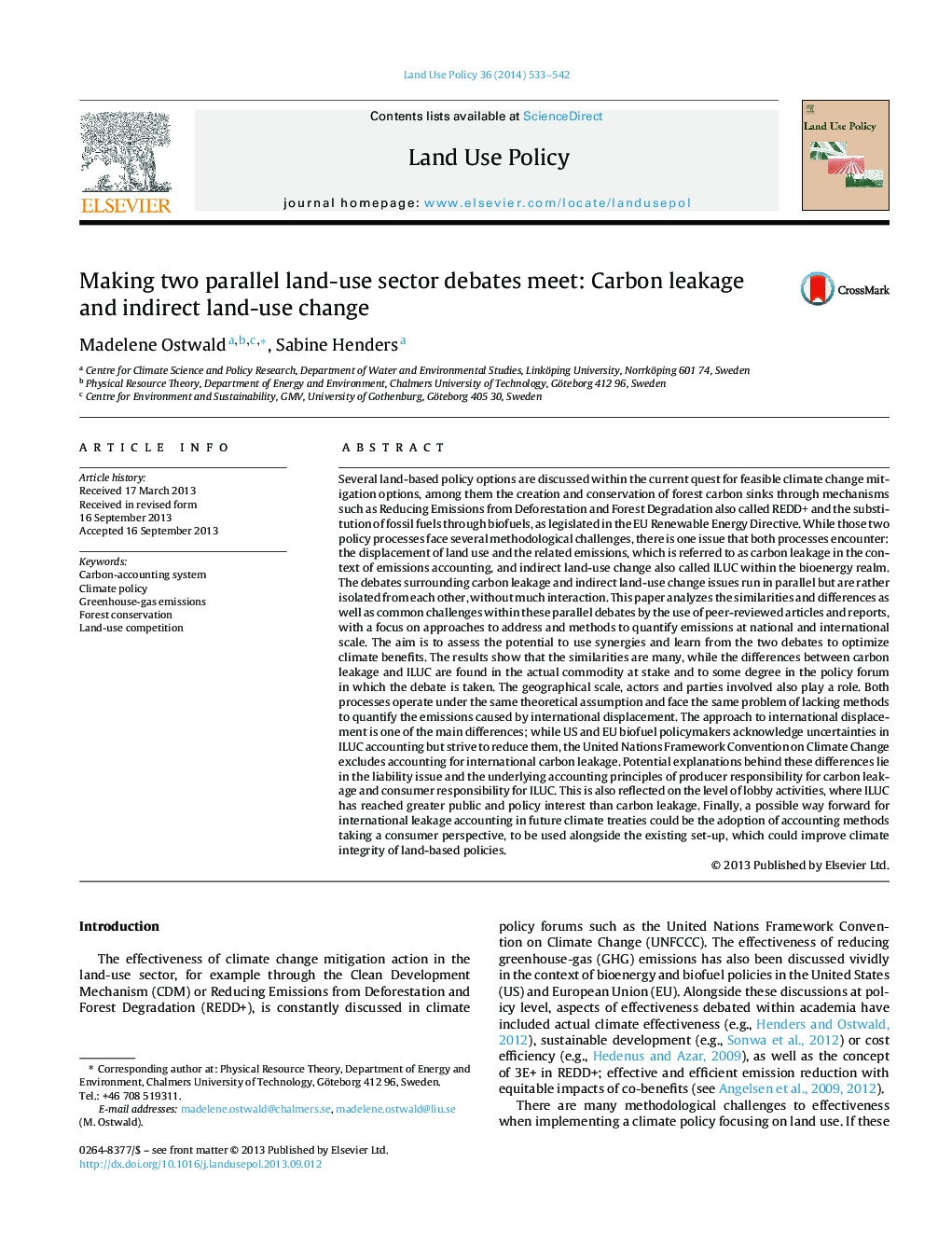| کد مقاله | کد نشریه | سال انتشار | مقاله انگلیسی | نسخه تمام متن |
|---|---|---|---|---|
| 6549041 | 160113 | 2014 | 10 صفحه PDF | دانلود رایگان |
عنوان انگلیسی مقاله ISI
Making two parallel land-use sector debates meet: Carbon leakage and indirect land-use change
ترجمه فارسی عنوان
ایجاد دو جلسه بحث و بررسی مسائل مربوط به زمینۀ استفاده همزمان: نشت کربن و تغییرات غیرمستقیم زمین
دانلود مقاله + سفارش ترجمه
دانلود مقاله ISI انگلیسی
رایگان برای ایرانیان
کلمات کلیدی
سیستم حسابداری کربن، سیاست آب و هوا، انتشار گازهای گلخانه ای، حفاظت از جنگل، مسابقه استفاده از زمین،
موضوعات مرتبط
علوم زیستی و بیوفناوری
علوم کشاورزی و بیولوژیک
جنگلداری
چکیده انگلیسی
Several land-based policy options are discussed within the current quest for feasible climate change mitigation options, among them the creation and conservation of forest carbon sinks through mechanisms such as Reducing Emissions from Deforestation and Forest Degradation also called REDD+ and the substitution of fossil fuels through biofuels, as legislated in the EU Renewable Energy Directive. While those two policy processes face several methodological challenges, there is one issue that both processes encounter: the displacement of land use and the related emissions, which is referred to as carbon leakage in the context of emissions accounting, and indirect land-use change also called ILUC within the bioenergy realm. The debates surrounding carbon leakage and indirect land-use change issues run in parallel but are rather isolated from each other, without much interaction. This paper analyzes the similarities and differences as well as common challenges within these parallel debates by the use of peer-reviewed articles and reports, with a focus on approaches to address and methods to quantify emissions at national and international scale. The aim is to assess the potential to use synergies and learn from the two debates to optimize climate benefits. The results show that the similarities are many, while the differences between carbon leakage and ILUC are found in the actual commodity at stake and to some degree in the policy forum in which the debate is taken. The geographical scale, actors and parties involved also play a role. Both processes operate under the same theoretical assumption and face the same problem of lacking methods to quantify the emissions caused by international displacement. The approach to international displacement is one of the main differences; while US and EU biofuel policymakers acknowledge uncertainties in ILUC accounting but strive to reduce them, the United Nations Framework Convention on Climate Change excludes accounting for international carbon leakage. Potential explanations behind these differences lie in the liability issue and the underlying accounting principles of producer responsibility for carbon leakage and consumer responsibility for ILUC. This is also reflected on the level of lobby activities, where ILUC has reached greater public and policy interest than carbon leakage. Finally, a possible way forward for international leakage accounting in future climate treaties could be the adoption of accounting methods taking a consumer perspective, to be used alongside the existing set-up, which could improve climate integrity of land-based policies.
ناشر
Database: Elsevier - ScienceDirect (ساینس دایرکت)
Journal: Land Use Policy - Volume 36, January 2014, Pages 533-542
Journal: Land Use Policy - Volume 36, January 2014, Pages 533-542
نویسندگان
Madelene Ostwald, Sabine Henders,
